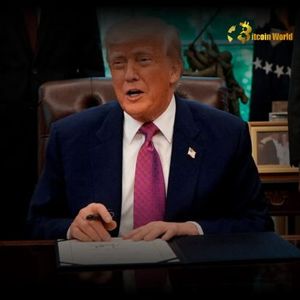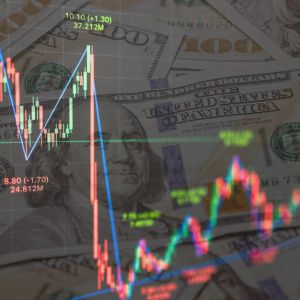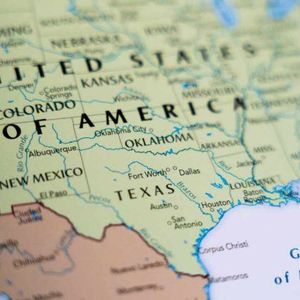BitcoinWorld US Tariffs: Crucial Appeal Challenges Executive Power Ruling While the world of cryptocurrency often feels distinct from traditional politics and trade disputes, major legal battles over US Tariffs and government authority can send significant ripples through global markets, influencing everything from investor sentiment to supply chain stability. This is precisely why a recent development regarding the Trump administration’s appeal of a court ruling blocking certain tariffs warrants our attention. Understanding the Core Dispute: What Are These US Tariffs? At the heart of this legal skirmish are tariffs that the Trump administration imposed on April 2nd. These duties were reportedly dubbed ‘Liberation Day’ tariffs, though the specific goods targeted aren’t detailed in the initial report. Tariffs, in essence, are taxes placed on imported goods. Governments use them for various reasons: To protect domestic industries from foreign competition. To generate revenue. To exert political or economic pressure on other countries. However, imposing tariffs isn’t always a straightforward executive decision. In the United States, the President’s power to impose tariffs is often derived from specific legislation passed by Congress. The Legal Challenge: Why Did the Court Block the Tariffs? A federal court issued a ruling that dealt a blow to the administration’s move, specifically blocking these ‘Liberation Day’ tariffs. The court’s reasoning centered on the scope of Executive Power , finding that President Donald Trump exceeded his authority under a key piece of legislation: the International Emergency Economic Powers Act (IEEPA) . Let’s break down what IEEPA is and why it’s relevant: What is IEEPA? The International Emergency Economic Powers Act, passed in 1977, grants the President the authority to regulate international commerce after declaring a national emergency in response to any unusual and extraordinary threat, which has its source in whole or substantial part outside the United States, to the national security, foreign policy, or economy of the United States. It’s a powerful tool designed for genuine crisis situations. The Court’s Finding: The court determined that the imposition of these specific tariffs did not fall within the legitimate scope of IEEPA as applied in this instance. This could mean several things: The situation prompting the tariffs wasn’t deemed a true ‘national emergency’ as defined by IEEPA’s use. The specific actions (the tariffs) weren’t directly related to addressing the declared emergency in a way the law permits. The President’s use of IEEPA bypassed other legal frameworks or congressional authority that should have been used for this type of trade action. Essentially, the court ruled that the administration’s action overstepped the legal boundaries set by Congress, challenging the extent of the President’s Government Authority in matters of Trade Policy when invoking emergency powers. The Appeal: Why is the Trump Administration Fighting Back? Reuters reported that the Trump administration quickly filed an appeal against this federal court ruling. This isn’t just about reversing the blocking of these particular tariffs; it’s a defense of the administration’s interpretation of presidential powers, particularly under IEEPA. The appeal signals several key objectives for the administration: Defending Executive Prerogative: The administration is likely arguing that the President’s authority under IEEPA is broad and that the court misinterpreted the scope of these emergency powers. Upholding the court’s ruling could set a precedent that limits future presidential actions on trade or other economic matters during perceived emergencies. Maintaining Trade Strategy Leverage: Tariffs are a key tool in the administration’s Trade Policy strategy. Losing the ability to impose them via IEEPA weakens their position in trade negotiations and disputes. Avoiding Congressional Constraints: Using IEEPA allows the executive branch to act unilaterally, bypassing the often lengthy and complex process of getting trade legislation through Congress. The appeal aims to preserve this more direct path to implementing trade measures. This appeal elevates the dispute from a specific tariff action to a significant constitutional question regarding the separation of powers and the limits of presidential authority, especially when invoking emergency statutes like the Economic Powers Act (IEEPA) . What Are the Potential Outcomes of This Crucial Appeal? The legal battle is now heading to a higher court, likely an appeals court, and potentially the Supreme Court. The possible outcomes include: Outcome Description Potential Implication for Trade Policy Court Upholds Ruling The appeals court agrees with the lower court that the President exceeded IEEPA authority. Significantly limits the President’s ability to use IEEPA for broad tariff actions, potentially requiring more congressional involvement in Trade Policy . Court Overturns Ruling The appeals court disagrees with the lower court, finding the President’s use of IEEPA was lawful. Affirms a broad interpretation of presidential emergency powers under IEEPA, giving the executive branch significant unilateral power in economic matters. Case is Remanded The appeals court sends the case back to the lower court for reconsideration based on specific instructions or clarification. Delays a final decision and requires further legal proceedings, prolonging uncertainty regarding the specific tariffs and the scope of Executive Power . Each outcome carries weight, not just for these specific tariffs, but for future presidential actions under emergency powers and the balance of power between the executive and legislative branches regarding Trade Policy and economic measures. Why Should a Crypto Enthusiast Care About Tariffs and Executive Power? While tariffs on goods might seem distant from Bitcoin or decentralized finance, this legal battle touches upon themes highly relevant to the cryptocurrency space: Macroeconomic Stability: Trade disputes and legal uncertainty surrounding Trade Policy can increase market volatility. Tariffs can disrupt supply chains, increase costs for businesses and consumers (potentially leading to inflation), and strain international relations. Such instability affects all markets, including crypto, which is often sensitive to global risk sentiment. Regulatory Risk and Government Overreach: The core of the court’s ruling is about limiting Government Authority and preventing potential executive overreach by adhering to legal statutes like the Economic Powers Act (IEEPA) . The crypto community is acutely aware of regulatory risk and the potential for governments to impose restrictions. This case is a high-profile example of the checks and balances within the US system pushing back against executive actions deemed beyond statutory limits. It highlights the ongoing tension between state power and economic freedom, a theme resonating with crypto’s decentralized ethos. Legal Precedent: The final ruling in this appeal will set a precedent for how emergency powers can be used in the future. A broad interpretation could empower future administrations to take swift, unilateral economic actions, which could theoretically extend to regulating digital assets under certain emergency declarations. A narrow interpretation could provide more clarity and potentially require more transparent, legislated approaches to economic controls. Global Economic Interconnectedness: Tariffs and trade wars underscore the interconnectedness of the global economy. Crypto markets operate globally, and disruptions in one major economic bloc can have ripple effects everywhere. Understanding these traditional economic pressures helps in navigating the broader financial landscape. Therefore, tracking this legal battle isn’t just about niche US Tariffs ; it’s about monitoring shifts in global economic stability, the balance of Government Authority , and the potential for regulatory actions stemming from executive power – all factors that can influence the environment in which cryptocurrency operates. Challenges and Actionable Insights Challenges: Prolonged Uncertainty: The appeal process takes time, leaving businesses and markets uncertain about the future of these specific tariffs and the broader implications for Trade Policy and the use of IEEPA. Economic Impact: Regardless of the legal outcome, the dispute itself can create friction in international trade relationships and add to global economic headwinds. Setting Precedent: The outcome could significantly alter the landscape of presidential power in economic matters, which has long-term implications. Actionable Insights for the Informed Reader: Stay Informed on Macro News: Don’t silo yourself to just crypto news. Major legal and economic developments like this appeal on US Tariffs and Executive Power are critical components of the broader financial ecosystem. Understand Regulatory Frameworks: While crypto aims for decentralization, it operates within a world governed by laws. Pay attention to how traditional regulatory powers (like those under IEEPA) are interpreted and applied, as this can offer clues about potential future approaches to digital assets. Assess Risk: Understand that macro-level events contribute to market risk. Legal challenges to Government Authority and shifts in Trade Policy can increase volatility. Consider how such factors fit into your overall investment strategy. Conclusion: A Battle for Authority with Wide-Reaching Implications The Trump administration’s appeal against the ruling blocking the ‘Liberation Day’ tariffs is far more than a simple procedural step; it’s a crucial legal battle defending the scope of presidential Executive Power , particularly under the International Emergency Economic Powers Act (IEEPA) . The federal court’s initial finding that the President exceeded his Government Authority highlights the vital role of judicial review in checking executive actions, especially concerning significant matters like US Tariffs and Trade Policy . As this appeal moves through the courts, its outcome will not only determine the fate of specific tariffs but will also set a potentially defining precedent for the balance of power in Washington and the legal limits of presidential action during times of perceived economic emergency. For anyone navigating the complex world of finance, including the dynamic cryptocurrency market, understanding these fundamental legal and economic disputes is essential, as they shape the very foundations upon which global markets operate. To learn more about the latest crypto market trends, explore our article on key developments shaping Bitcoin price action. This post US Tariffs: Crucial Appeal Challenges Executive Power Ruling first appeared on BitcoinWorld and is written by Editorial Team



















